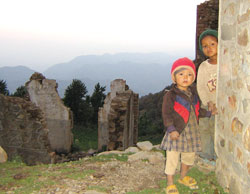|
|
| WHERE IT ALL STARTED: The police station in Holeri that was destroyed in 1996 is still in ruins. The Maoists have refused to allow the police back. |
In February 1996 the Maoists launched their 'people's war' by raiding this post. In July 2001, the station was attacked again and 71 policemen were abducted. Prime Minister Girija Koirala tried to mobilise the army to rescue them, and when the generals refused he resigned.
Now, with the Maoists in government the Holeri police station, like others across the country, should have been restored. But Rolpa's ex-rebels have a different set of rules for the district that they regard as the birthplace of their revolution.
"The only difference is that the Maoists don't have guns, otherwise nothing has changed here," says Dambar Bahadur Roka of Balbang, "they still threaten anyone who doesn't agree with them."
It is the same story in village after village in Rolpa. Farmers who till last year were too afraid to talk now speak openly about Maoist intimidation. And by needlessly harassing locals, the Maoists seem to be undermining their own position in a future election. Most politicians in the mid-western hills say free elections are just not possible under these conditions.
Although there is now less extortion, abductions and instances of villagers being forced to feed guerrillas, the fear isn't completely gone. On 4 April, Maoists abducted the 76-year-old mother of Bal Prasad Buda who had just returned from the Gulf because he refused to give a \'donation\'. She was released two days later after Buda agreed to give them the jewelry his mother was wearing and Rs 60,000.
Incidents like these have convinced local leaders of the seven parties that the Maoists have not changed. A district leader of the Maoists told a public gathering in Balbang last month: "If you don't vote for us, we will go back to war." Local politicians say this has become the Maoist campaign slogan across the mid-western hills. The UML's Rolpa MP Gopal Dangi says the Maoists have still not developed a culture of tolerating dissenting views: "The threat levels are still high, we are under psychological stress and have to weigh our words before speaking. "
Three reporters on assignment in Rolpa got a taste of this when they were subjected to threats and hostile interrogation while covering a story. Another UML representative from Rolpa, Nim Prasad Rokka says: "They will use threats or force to get their way, you have seen for yourself what they are capable of."
The Maoists may be in government in Kathmandu, but here they treat all other parties like they always have: as class enemies. "They may not wave their guns, but their methods have not changed," says Holeri civil society member Rishi Ram Shrestha, "the people are still afraid."
The Maoists have 4,500 fighters in their Fifth Division cantonment in Dahaban, but have also established sub-cantonments in Holeri and Kharse in contravention of the agreement with UNMIN. They haven't allowed police stations in Holeri in Rolpa and in Salyan to reopen. Asks a local Maoist: "We are providing security so why do you need a police station?"
"We'll fix you."
- Comrade Sharad
There had been an all-party agreement that villagers of Dahaban would get priority on water. But as water became scarce in the dry season, Maoists from the nearby cantonment started taking the water. When villagers complained to the local administration, the Maoists threatened to kill local leaders, including the vice chairman of Sakhi VDC, Ghanashyam Khadka.
On 19 April, three journalists happened to walk into an all-party meeting in Dahaban to resolve the dispute in which many local villagers were also taking part. Maoist Fifth Division commander, Comrade Sharad was gesturing aggressively and threatening party leaders in a loud voice: "We'll fix you."
When CDO Topendra KC tried to calm him down, Sharad said: "Watch it, if you do anything I'll break your arms and legs."
Just as we had started taking pictures of the proceedings, Sharad and another Maoist named Abinash started roughing us up. We tried to say we were press, but they started shouting at us accusing us of being spies and took away our cameras. The CDO, political leaders and villagers were too afraid to speak up. We found out later this is standard behaviour of Maoist cadre in Rolpa and local politicians are terrified to even speak with Sharad.
All three of us were forced to get down from our bikes by Abinash and detained. "You go when I tell you to go," he said. Two hours later, our cameras were returned and we were told we could go.
Rameswor Bohara



